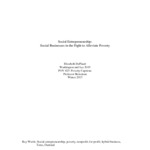| dc.rights.license | In Copyright | en_US |
| dc.creator | DePlautt, Elizabeth K. | |
| dc.date.accessioned | 2015-09-09T17:55:02Z | |
| dc.date.created | 2015 | |
| dc.identifier | WLURG38_DePlautt_POV_2015 | |
| dc.identifier.uri | http://hdl.handle.net/11021/32375 | |
| dc.description | Elizabeth K. DePlautt is a member of the Class of 2015 of Washington and Lee University. | en_US |
| dc.description | Capstone; [FULL-TEXT RESTRICTED TO WASHINGTON AND LEE UNIVERSITY LOGIN] | en_US |
| dc.description.abstract | This brings us to the main question: how can social businesses best help in alleviating poverty? I will argue that the hybrid business model, one that combines aspects of both for-profit and nonprofit in their organizational structure, is the best model for alleviating poverty as it allows for the most financial and legal flexibility in using their funds to carry out their mission. [From Introduction] | en_US |
| dc.format.extent | 21 pages | en_US |
| dc.language.iso | en_US | en_US |
| dc.rights | This material is made available for use in research, teaching, and private study, pursuant to U.S. Copyright law. The user assumes full responsibility for any use of the materials, including but not limited to, infringement of copyright and publication rights of reproduced materials. Any materials used should be fully credited with the source. | en_US |
| dc.rights.uri | http://rightsstatements.org/vocab/InC/1.0/ | en_US |
| dc.subject.other | Washington and Lee University, Shepherd Poverty Program | en_US |
| dc.title | Social Entrepreneurship: Social Businesses in the Fight to Alleviate Poverty | en_US |
| dc.type | Text | en_US |
| dcterms.isPartOf | RG38 - Student Papers | |
| dc.rights.holder | DePlautt, Elizabeth K. | |
| dc.subject.fast | Poverty | en_US |
| dc.subject.fast | Nonprofit organizations | en_US |
| dc.subject.fast | Social entrepreneurship | en_US |
| dc.subject.fast | Dannon Company | en_US |
| local.department | Shepherd Poverty Program | en_US |
| local.scholarshiptype | Capstone | en_US |
